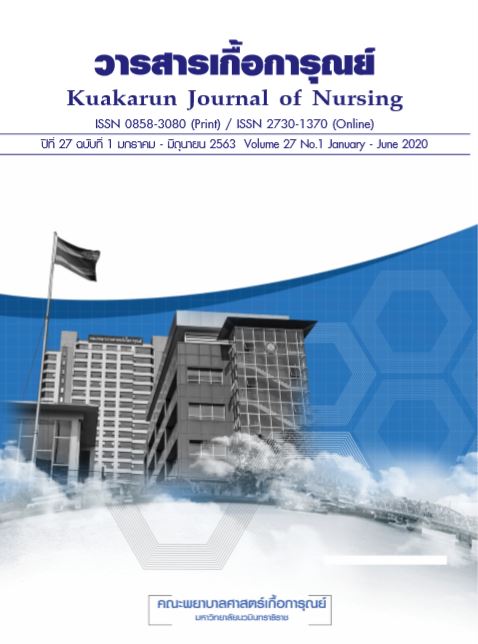ความสำเร็จของการเลี้ยงลูกด้วยนมแม่อย่างเดียวอย่างน้อย 6 เดือน: กรณีศึกษาจังหวัดนครปฐม
คำสำคัญ:
เลี้ยงลูกด้วยนมแม่, นมแม่อย่างเดียว 6 เดือน, ส่งเสริมเลี้ยงลูกด้วยนมแม่บทคัดย่อ
การวิจัยเชิงคุณภาพครั้งนี้มีวัตถุประสงค์เพื่อศึกษาประสบการณ์ของความสำเร็จของการเลี้ยงลูก ด้วยนมแม่อย่างเดียวอย่างน้อย 6 เดือนแรกหลังคลอด ผู้ให้ข้อมูลคือแม่ที่เลี้ยงลูกด้วยนมแม่ 6 เดือน หรือมากกว่าแต่ไม่เกิน 1 ปี ที่พักอาศัยอยู่ในตำบลเขตอำเภอเมืองฯ จังหวัดนครปฐม โดยการเลือกกลุ่ม ผู้ให้ข้อมูลแบบเจาะจงคือผ่านการคลอดจากโรงพยาบาลนครปฐม จำนวน 38 ราย เครื่องมือที่ใช้ ในการเก็บรวบรวมข้อมูล ได้แก่ แบบสัมภาษณ์แบบกึ่งมีโครงสร้าง เป็นเครื่องมือในการเก็บรวบรวมข้อมูล ตรวจสอบความเที่ยงตรงของข้อมูลแบบสามเส้าด้วยการทบทวนข้อมูล วิเคราะห์ข้อมูลด้วยวิธีการวิเคราะห์ แก่นสาระ
ผลการวิจัยพบว่า ผู้ให้ข้อมูลเป็นแม่หลังคลอดอายุโดยเฉลี่ยอายุ 26.9 ปี ประสบการณ์ที่สำคัญของ ความสำเร็จในการเลี้ยงลูกด้วยนมแม่อย่างเดียวอย่างน้อย 6 เดือนมีสามประเด็นได้แก่ 1) แรงจูงใจภายใน ตนเองในการเลี้ยงลูกด้วยนมแม่ ประกอบไปด้วย การเห็นถึงคุณประโยชน์ของนมแม่ การเลี้ยงลูกด้วยนมแม่ ประหยัดค่าใช้จ่ายในการเลี้ยงดูบุตร และค่านิยมในการเลี้ยงลูกด้วยนมแม่ 2) สิ่งสนับสนุนส่งเสริมช่วยให้ แม่เลี้ยงลูกด้วยนมแม่สำเร็จ ประกอบไปด้วย ความช่วยเหลือจากบุคคลในครอบครัวและเพื่อนสนิท และ การสนับสนุนจากบุคลากรทางการแพทย์ 3) การฝ่าฟันอุปสรรคในการเลี้ยงลูกด้วยนมแม่ ประกอบไปด้วย อุปสรรคจากปัญหาสุขภาพของมารดา ความสะดวกในด้านสถานที่ในการบีบเก็บน้ำนม และครอบครัวขาดความเข้าใจในความสำคัญของการเลี้ยงลูกด้วยนมแม่ ดังนั้น ควรศึกษาสนับสนุนให้แม่และสมาชิก ในครอบครัวมีความตั้งใจที่จะเลี้ยงลูกด้วยนมแม่อย่างแน่วแน่ รวมทั้งบุคลากรทางการแพทย์ควรค้นหาเชิงรุก ในแม่ที่มีปัญหาเกี่ยวกับการให้นมแม่ทุก ๆ เรื่อง และช่วยกันแก้ไขปัญหา เพื่อส่งเสริมให้เด็กไทยได้รับนมแม่ อย่างเดียวนานตามที่กำหนดและนานที่สุด เป็นการส่งเสริมสุขภาพพื้นฐานในการพัฒนาด้านร่างกายและ จิตใจเด็กเพื่อเติบโตเป็นประชากรที่มีคุณภาพของสังคมต่อไป
เอกสารอ้างอิง
Jirapaet K. Breastfeeding. importance of human resource development. In: Vongmongkol N, editor. Manual breastfeeding training guide. Bangkok: War Veterans Organization Office of Printing Mill; 2010. (in Thai)
Vichitsukon K, Sangperm P, Watthayu N, Ruangiratain S, Payakkaraung S. Breastfeeding. Bangkok: Pre-one; 2012. (in Thai)
Loompikanon P. President’s message of the Royal Thai College of Obstetrics and Gynecologists. In: Puapornpong P, Ieamjirakul K, Choomtoo S, Damroongwongsiri A, editors. Clinical practice of breastfeeding. Bangkok: Beyond enterprise; 2016. (in Thai)
National Statistical Office of Thailand. Final report Thailand survey situation children and women in Thailand 2015-2016 [revised edition 1 July 2017] [Internet]. 2017 [cited 2019 Oct 23]. Available from: http://www.ratchakicha.soc.go.th/ DATA/PDF/2560/A/072/1.PDF (in Thai)
Payakkaraung S. Hot issue and challenge in breastfeeding. In: Vichitsukon K, editor. Join forces, Create Breastfeeding Job Development Conference; 2019 Nov 6-8. Bangkok: 2019. (in Thai)
Choosri O. Family love bond tambon project fiscal year 2017 [Internet]. 2017 [cited 2017 Oct 22]. Available from: http://localfund.happynetwork.org/paper/10247 (in Thai)
Suebsai P. Sustainable development breastfeeding corner in work place [Internet]. 2017 [cited 2017 Oct 23]. Available from: https://library.thaibf.com/handle/023548404.11/350
Tawornwattana S. Breaking the barrier: breastfeeding at the beginning. Sustaining Breastfeeding Together; 6th Nation Breastfeeding Conference; Bangkok. Nonthaburi: PNS creation; 2017. p. 59-63. (in Thai)
Ministry of Public Health. Action Follow Code of Marketing of Breastmilk Substitutes 2018 31st July 2018 at NPH [Press release]. Nonthaburi: Ministry of Public Health; 2018. (in Thai)
World Health Organization. Infant and young child feeding: fact sheet update July 2017 [Internet]. 2017 [cited 2020 Mar 15]. Available from: http://www/who.int/mediacentre/factsheets/fs342/en/http://www/who.int/%20mediacentre/%20factSheets/fs342/en/
Nakorn Prathom Hospital. Obstetric statistic PCT 2013-2018. exclusive breastfeeding 6 months from NPH. Nakorn Prathom: Nakorn Prathom Hospital. (in Thai)
Chin L, Amir LH. Survey of patient satisfaction with the breastfeeding education and support services of the Royal Women’s Hospital, Melbourne. BMC Health Services Research 2008;8:83.
Miles MB, Huberman AM. Qualitative data analysis: an expanded sourcebook. Thousand Oaks (CA): SAGE Publications; 1994.
Cohen L, Manion L. Research method in education. 4th ed. New York: Routledge; 1994.
Charlick SJ, Fielder A, Pincombe J, McKellar L. Determined to breastfeed: a case study of exclusive breastfeeding using interpretative phenomenological analysis. Women and Birth 2017;30(4):325-31.
Ben Natan M, Wiener A, Ben Haim Y. Womens intention to exclusively breast feed: the Israeli perspective. Midwifery 2016;34:173-7.
Pender NJ, Murdaugh CL, and Parson MA. Health promotion in nursing practice. 4th ed. Upper Saddle River (NJ): Prentice Hall; 2002.
Apartsakun P. Value of breastfeeding in Thai mothers: nursing roles. Journal of The Royal Thai Army Nurses 2018;19 Suppl 2:53-61. (in Thai)
Apartsakun P. Value of breastfeeding in Thai mothers: nursing roles. Journal of The Royal Thai Army Nurses 2018;19 Suppl 2:53-61. (in Thai)
Cohen S, Gottlieb BH, Underwood LG. Social relationships and health. In Cohen S, Underwood LG, Gottlieb BH, editors. Social support measurement and intervention: a guide for health and social scientists. New York: Oxford University Press; 2000. p. 3-25.
Chanapai S, Sinsuksai N, Thananowan N, Phahuwatanakorn W. Knowledge, attitude, self- efficacy, spousal and nurse support predicting 6-weeks exclusive breastfeeding. Nursing Science Journal of Thailand 2014;32(1):51-60. (in Thai)
Nutbeam D. Health literacy as a public health goal: a challenge for contemporary health education and communication strategies in to health 21st century. Health Promotion International 2000;15(3).

















